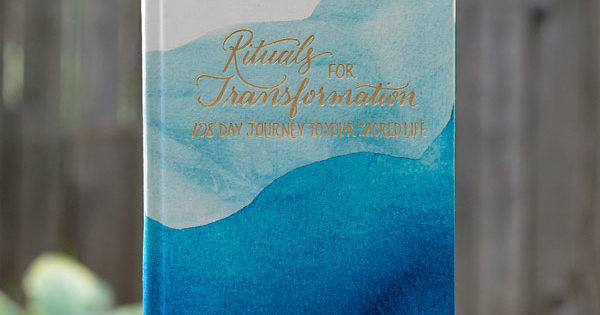Today is the pre-release for our new book, called Rituals for Transformation, which we wrote over the past year. It feels a little daunting to put it out in the world, because it goes places where our previous works haven’t.
Our earlier efforts were mainly about teaching people how to make material changes in their lives. We taught things like self-care, goal setting, planning, and relationship building. We’ve seen great value in this work, and have tons of success stories to back it up, but we saw a need to go deeper.
While there is so much about our material circumstances that to be grateful for, we feel there’s an even higher aim: a state of wellbeing that’s with us regardless of circumstances. All along, we’ve touched on the psychological and spiritual perspectives that go along with an exceptional life, but this is the first work we’ve dedicated entirely to this dimension.
For us, the most effective programs for change involved being immersed in a group or training for an extended period of time without breaks, and that’s what we intended to create here. It’s a framework for transformation – for healing the mind, changing perspective, and opening to Spirit. A 108-day course for developing the kind of outlook that makes peace and joy accessible regardless of what’s happening in your life.
Knowing how busy people are these days, we made it so that you can benefit from it even if you’re only able to dedicate a modest amount of time and energy (though we encourage participants to invest more whenever possible). Each day involves a small amount of reading (just one page), meditation, writing, and applying the day’s lesson throughout the day. By the 108th day, you’ll be in a different place.
It’s a journey that’ll change you. If you’re someone who fears change, rest assured that the change we’re talking about is for your highest good. This means it may not be what’s easiest or fastest, but it’s the deepest and the realest kind of change.
- How would it be if you felt trust rather than fear in times of uncertainty?
- What if you were at peace with your body, regardless of its appearance or function?
- How would life be different if you weren’t controlled by your thoughts and emotions?
- What would life be like if you were able to focus on all the things you’re grateful for, rather than being consumed by the problems?
- How would it feel to be okay with whatever happens?
- What would it be like to experience yourself as one with the Source of everything, playing in this life while always remembering that you are loved and connected?
Sound good? We’re with you. This is the kind of life we want, too. We’re engaged in this work day in and day out, and we’ll be doing it for the rest of our lives. There’s a challenge and an opportunity in every moment. And there’s great joy and inspiration in sharing this process with others. That’s why we decided to write this book – so there will be more of us consciously walking the path together, sharing support, shining a light on darkness and untruth, jointly rising to the occasion.
We’d love to have you join us.
Be well,
Briana and Dr. Peter Borten



 Cart
Cart

Please let me know when book is available
Hi Catherine, its available to order now and will begin shipping on August 11th.
I’d love to order the book. What is the price of the book? As well as the price of the course?
Can you make a pdf version of this new book / tool?
I’m about 1/4 through the transformation and have to say, the results so far are incredible. Thank you for creating this guide that will help so many.